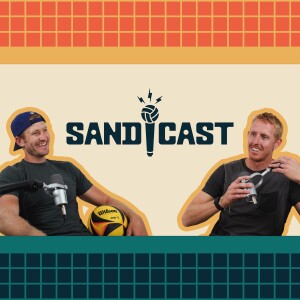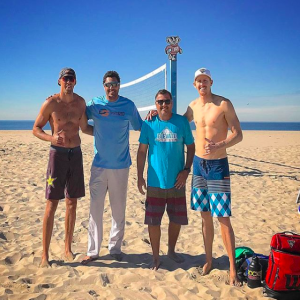
SANDCAST: Beach Volleyball with Tri Bourne and Travis Mewhirter
Sports:Volleyball

It began as something fun. Nothing much more than, well, why not? Why not put two childhood friends on the same team? Friends who play the same side, the same position, who had never played defense at a professional level.
And yet there Tri Bourne and Trevor Crabb were, winning in Manhattan Beach, finishing with a seventh. Winning in Chicago, improving to fifth. Winning in China, claiming a gold medal. Winning in Hawaii, making a Sunday. Winning in Las Vegas, nearly stunning Russia’s top team, Viacheslav Krasilnikov and Oleg Stoyanovskiy, for a bronze medal. Winning despite Bourne not having played for nearly two years. Winning despite Bourne tweaking a rib. Winning despite neither of them really having any clue what to do on defense at the game’s highest level. Winning despite neither having played much right side in their careers.
And now here we are, in 2019, with the Olympic race beginning in earnest this week at The Hague, and Bourne and Crabb, the team that few, even themselves, predicted to be legitimate contenders, or even a team at all, are training full-time, pushing for a berth to Tokyo in 2020.
“We’re gonna stick with our plan,” Bourne said on SANDCAST: Beach Volleyball with Tri Bourne and Travis Mewhirter. “We’re still a new partnership, obviously. Last time we played in 2018 it was a honeymoon phase, even though me and Trevor have been playing against each other our whole lives. We had a lot to figure out, were just winging it at the end of 2018, so now we gotta figure out what our system is, figure out how the hell to play defense, and so I’m excited.”
The commitment establishes Bourne and Crabb as the only split-blocking team in the U.S., and one of the few in the world at the game’s highest level. Currently, Spain’s Pablo Herrera and Adrian Gavira, Latvia’s Janis Smedins and Aleksandrs Samoilovs and Brazil’s Evandro Goncalves and Andre Loyola are the handful who have been able to succeed with neither partner specializing in either defensive position.
“You just feel like you should specialize because the rest of the world is,” Bourne said. “I’m super excited about it. I’ve always taken a lot of pride in being able to do every skill. Indoors, I played libero a little bit at USC, played middle blocker, so I’ve taken a little skill set from each position indoors and that’s what’s developed me for beach. I didn’t like being a specialized blocker even though it’s my favorite skill and the one I probably took the most pride in the last five years.
“But now I get to do it all. I’m stoked on that.”
He knows there’s going to be a learning curve, that their quick success was perhaps aided by the unconventional style and the lack of preparation teams could do against them. Which is why the Olympic race is not a sprint, but a two-year international grind, one Bourne and Crabb are now set on doing together.
“At the end of the year, we both took some time, and we weren’t for sure going to play with each other, we took time to figure out what was best for ourselves individually, but we both kind of came around – this is too fun,” Bourne said. “Why not, you know?”
More Episodes
 2024-03-11
2024-03-11
 1.6k
1.6k
 2024-02-21
2024-02-21
 2.6k
2.6k
 2024-01-24
2024-01-24
 2.4k
2.4k
 2024-01-17
2024-01-17
 2.3k
2.3k
 2024-01-10
2024-01-10
 2.3k
2.3k
Create your
podcast in
minutes
- Full-featured podcast site
- Unlimited storage and bandwidth
- Comprehensive podcast stats
- Distribute to Apple Podcasts, Spotify, and more
- Make money with your podcast
It is Free
- Privacy Policy
- Cookie Policy
- Terms of Use
- Consent Preferences
- Copyright © 2015-2024 Podbean.com



